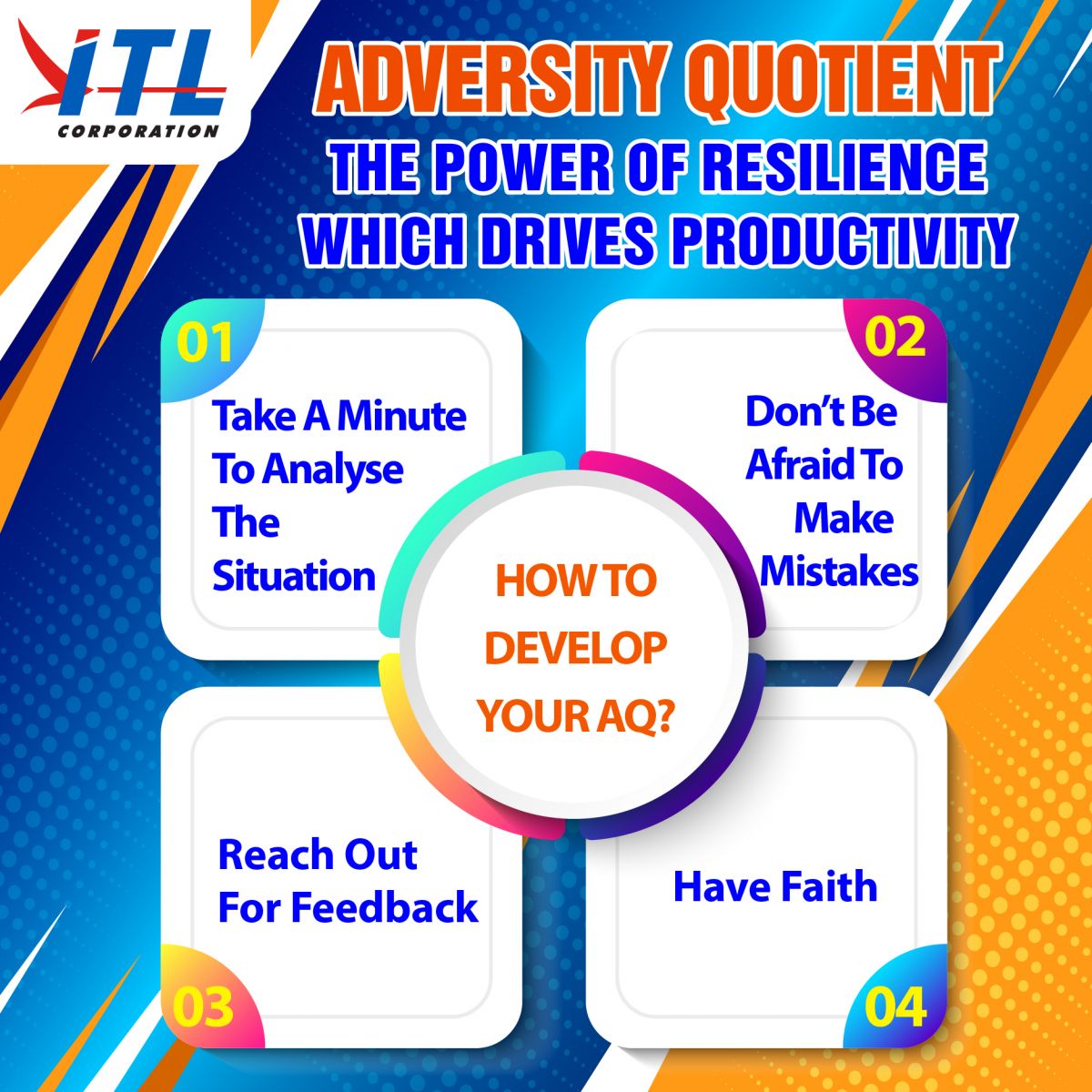12
07/21
Adversity Quotient - The Power Of Resilience Which Drives Productivity
People often judge an individual with regard to his or her intellectual capacity and cognitive abilities. We are misguided by the assumption that someone’s success is determined by their smartness. Intelligence is indeed an integral part of excellence. But success is not only determined by one’s achievements, but is also dependent upon how capable an individual is to persevere in times of adversities. Life is unprecedented at times and we may encounter several challenges in our journey towards triumph. Thus it is necessary to develop skills that enable us to overcome these challenges and to grow out of it. This ability of individuals to overcome hardships is labeled as the adversity quotient.
What is adversity quotient?
Adversity quotient (AQ) measures one’s ability to cope and deal with adverse circumstances. It is also commonly referred to as resilience which demonstrates how a person responds when faced with life’s difficulties, from small hassles that come your way on a daily basis to more serious stress or pressure at work and life.
AQ can measure a person's level of ambition, effort, creativity, energy, physical health, emotions, and happiness. It is also an indicator of four levels of life courage:
1. Facing difficulties
2. Turning the situation around
3. Overcoming adversities
4. Finding a way out

AQ can measure a person's level of ambition, effort, creativity, energy, physical health, emotions, and happiness. It is also an indicator of four levels of life courage:
1. Facing difficulties
2. Turning the situation around
3. Overcoming adversities
4. Finding a way out

AQ is one of the factors contributing to success
Understanding how a person responds to adversities is considerably useful in terms of predicting their endurance, mental capacity, perseverance, attitudes and how quickly they can adapt to changes in environment. These factors are strong indicators of the ability to succeed in many aspects of life, especially in workplace.
Possessing high AQ is analogous to being able to courageously learn and bounce back from setbacks. Whenever adversities strike, high-AQ people incline toward analysing the situation with the desire to exert a certain level of influence and control over stressful circumstances. Plus, people with higher AQ view hardships as temporary situations which will soon pass, as a result, they are more likely to soldier on and their recovery process happens relatively faster compared to those with lower AQ level.
These characteristics help high-AQ individuals gain the upper hand in most situations since they do not dwell on the negative aspects, instead, they spend more efforts on figuring out how to improve the circumstances. In the context of workplace, people with good AQ are believed to bring longer term stability and loyalty since they do not quit easily when obscurities come in way, these traits entrench their position as troubleshooters and reliable team players in any organisation.
Resilience also fuels work productivity as it is the key determinant of one’s ability to follow through and attain set goals. Unlike people with lower AQ, resilient individuals apparently overcome adversities and setbacks with relative ease, this reduce the possibility of them opting out once things derail or do not go as planned.
In addition, AQ is closely linked with mental resilience which is pivotal in sustaining one’s emotional well-being in the face of sudden issues and changes.
In our competitive and dynamic business world, AQ is believed to be the most important intelligence to have since we do not know the challenges we have to deal with every day. We constantly aim for success and winning the business, so it is very important to have high resilience and stability throughout the collective enterprise. Meaning, each and everyone in our team has to have it.
Possessing high AQ is analogous to being able to courageously learn and bounce back from setbacks. Whenever adversities strike, high-AQ people incline toward analysing the situation with the desire to exert a certain level of influence and control over stressful circumstances. Plus, people with higher AQ view hardships as temporary situations which will soon pass, as a result, they are more likely to soldier on and their recovery process happens relatively faster compared to those with lower AQ level.
These characteristics help high-AQ individuals gain the upper hand in most situations since they do not dwell on the negative aspects, instead, they spend more efforts on figuring out how to improve the circumstances. In the context of workplace, people with good AQ are believed to bring longer term stability and loyalty since they do not quit easily when obscurities come in way, these traits entrench their position as troubleshooters and reliable team players in any organisation.
Resilience also fuels work productivity as it is the key determinant of one’s ability to follow through and attain set goals. Unlike people with lower AQ, resilient individuals apparently overcome adversities and setbacks with relative ease, this reduce the possibility of them opting out once things derail or do not go as planned.
In addition, AQ is closely linked with mental resilience which is pivotal in sustaining one’s emotional well-being in the face of sudden issues and changes.
In our competitive and dynamic business world, AQ is believed to be the most important intelligence to have since we do not know the challenges we have to deal with every day. We constantly aim for success and winning the business, so it is very important to have high resilience and stability throughout the collective enterprise. Meaning, each and everyone in our team has to have it.
How to develop your AQ?
Most people with high EQ (emotional quotient) have high AQ. But not always and for everyone between EQ and AQ, they are proportional. If you do not improve your AQ, smart and good people can still be unhappy being unable to overcome adversities. The good news is AQ can be cultivated and improved through implementing some changes regarding one’s practice as well as perception.
1. Take a minute to analyse the situation
Panic attacks stemming from sudden adversity can cause one to react rashly and irrationally. Instead of responding immediately, spend some time to look deep into the root cause of the problem in search for the most optimal respond.
2. Don’t be afraid to make mistakes
Don’t let the fear of failing get the best of you. See making mistakes as a form of approaching a problem comprehensively and adopt a learner mindset which will enable you to bounce back from mistakes and learn from them.
3. Reach out for feedback
Don’t isolate yourself and struggle in silence once a crisis emerges. Ask others for advice and get feedback about how you can better your adversity coping methods. This process will help improve one’s self-awareness and break passive patterns of responses to problems.
4. Have faith
Believing that every hardship has its own reason for happening is crucial in terms of dealing with them mentally and emotionally. Stress and anxiety, from a lack of faith, can severely impair our judgment as well as the ability to respond constructively. Reinforcing faith in ourselves helps mitigate the level of pressure in which difficult circumstances put us in order to implement apt solutions
*Source:careersnashtechglobal/psychologs.com
*Source:careersnashtechglobal/psychologs.com














